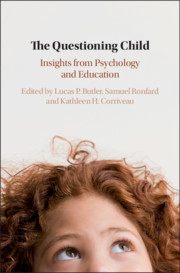Book contents
- The Questioning Child
- The Questioning Child
- Copyright page
- Dedication
- Contents
- Figures
- Tables
- Contributors
- 1 Questions about Questions
- 2 Questions in Development
- 3 The Point, the Shrug, and the Question of Clarification
- 4 The Quest for Comprehension and Learning
- 5 Children’s Question-Asking across Cultural Communities
- 6 The Development of Information-Requesting Gestures in Infancy and Their Role in Shaping Learning Outcomes
- 7 Developmental Changes in Question-Asking
- 8 Understanding Developmental and Individual Differences in the Process of Inquiry during the Preschool Years
- 9 “Why Are There Big Squares and Little Squares?”
- 10 Children’s Questions in Social and Cultural Perspective
- 11 Mothers’ Use of Questions and Children’s Learning and Language Development
- 12 Teaching and Learning by Questioning
- 13 Asking “Why?” and “What If?”
- 14 What Makes a Good Question? Towards an Epistemic Classification
- 15 The Questioning Child
- Index
- References
12 - Teaching and Learning by Questioning
Published online by Cambridge University Press: 10 January 2020
- The Questioning Child
- The Questioning Child
- Copyright page
- Dedication
- Contents
- Figures
- Tables
- Contributors
- 1 Questions about Questions
- 2 Questions in Development
- 3 The Point, the Shrug, and the Question of Clarification
- 4 The Quest for Comprehension and Learning
- 5 Children’s Question-Asking across Cultural Communities
- 6 The Development of Information-Requesting Gestures in Infancy and Their Role in Shaping Learning Outcomes
- 7 Developmental Changes in Question-Asking
- 8 Understanding Developmental and Individual Differences in the Process of Inquiry during the Preschool Years
- 9 “Why Are There Big Squares and Little Squares?”
- 10 Children’s Questions in Social and Cultural Perspective
- 11 Mothers’ Use of Questions and Children’s Learning and Language Development
- 12 Teaching and Learning by Questioning
- 13 Asking “Why?” and “What If?”
- 14 What Makes a Good Question? Towards an Epistemic Classification
- 15 The Questioning Child
- Index
- References
Summary
How can we encourage adolescents to ask the most effective questions? Several different lines of research design children’s and adolescents’ learning environments in ways that capitalize on self-initiated, largely self-directed question-asking and answer-seeking. We describe a number of studies indicating that such contexts yield effective outcomes for several different kinds of learning and across different populations. We discuss inquiry, and its importance for students developing a sense of agency and value in conducting their own inquiry and their learning more broadly. The role of argument, a context in which claims are expected to be justified by appeal to evidence, is highlighted as it can lead one to question a claim being made, and thus be seen as a driving factor to engaging in discourse about a claim. Finally, we stress that teachers must learn to cede control to an extent that allows students autonomy in choosing questions they find authentic and worthy of pursuit, and in letting students engage and address one another directly, allowing them to develop the norms of discourse that reinforce accountability to one another.
Keywords
- Type
- Chapter
- Information
- The Questioning ChildInsights from Psychology and Education, pp. 232 - 251Publisher: Cambridge University PressPrint publication year: 2020
References
- 6
- Cited by



